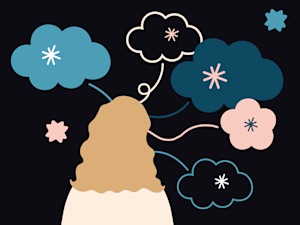Stay in the know
All our latest podcasts delivered right to your inbox.
Executive function comes up all the time in our interviews with people with ADHD. Why is that? Expert Dr. Karen Wilson joins Laura in this episode to explain. She defines executive function and talks about the types of skills under the executive function umbrella.
Dr. Wilson answers questions like: Does everyone with ADHD have executive function challenges? And what’s the link between executive function and mental health challenges like anxiety?
Dr. Wilson is a clinical neuropsychologist and the founder of ChildNEXUS, a web application that connects parents of kids with learning or mental health challenges with service providers. Tune in to learn about the connection between ADHD and executive function — and what it means for people with ADHD in everyday life.
Related resources
Episode transcript
Laura: From the Understood Podcast Network, this is "ADHD Aha!", a podcast where people share the moment when it finally clicked that they or someone they know has ADHD. My name is Laura Key. I'm the editorial director here at Understood, and as someone who's had my own ADHD "aha" moment. I'll be your host. I am here today with Karen Wilson. Karen is a clinical neuropsychologist and the founder of ChildNEXUS, a web application that connects parents of kids with learning or mental health challenges with youth service providers. Karen is also an Understood expert — yay!— and very important for today, an executive function expert. Karen, welcome. Thank you so much for being on the show.
Karen: Well, thank you so much for having me.
Laura: To start, Karen, could you sum up in one or two sentences what is executive function?
Karen: It's such a big term and it applies to so many different things. But to summarize it, it really refers to the ability to really problem-solve and ultimately achieve goals, which we know requires a number of different steps.
Laura: I'm impressed. That was a very succinct explanation for such a big topic. Let me ask you this. I've sometimes heard executive function referred to as the CEO of the brain or the management system of the brain. Is that accurate? And if so, what does that mean?
Karen: Yeah, I think it's because executive functioning is most closely associated with the front areas of the brain, which we kind of think about as the entity that is orchestrating all of the other neurons and connections in the brain. And it's also the last part of the brain to develop. And so it's responsible for kind of coordinating a lot of the other things that we do. And so people think about that as like the CEO of the brain.
Laura: Interesting. The last part of the brain to develop. Can you say more?
Karen: Yes, I'd love to. You know, when we think about the brain, by age six, the brain is probably about 95% of the adult size brain. But the brain continues to thicken. We develop new connections and the front part of the brain, that frontal lobe is the last part of the brain to develop, which means that it continues to develop all the way into our mid-twenties. You know, when I think about children, I think about a child and an adult running across a field, and they both can look identical in terms of their motor skills. The child might even be a little bit faster than the adult, depending on who the adult is. But when we think about that same child's ability to plan, to organize, to prioritize, to manage their time, obviously they're going to be significant differences between a child and the adult. And that's because those executive functions, that planning, the organization, prioritizing, time management don't develop fully until much later.
Laura: I love that image of the adult and child running in the field. That really brought that to life for me. So, why does executive function come up so much when we're talking about ADHD?
Karen: Well, I think it's because executive functioning is impacted significantly in individuals with ADHD. When we think about ADHD, we think about problems paying attention, hyperactivity, impulsive behavior. But in individuals with ADHD, they also have struggles with executive functioning. They find it difficult to not only focus, but to also prioritize, to also meet deadlines. They struggle with controlling their impulses, but also have a lot of trouble managing their time. And so, the same areas of the brain that are responsible for attention and inhibiting distractions, that area of the brain, that frontal part of the brain is also responsible for those executive functions. And so, when we see individuals struggling with other symptoms of ADHD, like inattention and hyperactivity, they also tend to struggle with executive functioning.
Laura: Could you say that executive function challenges and ADHD are synonymous? Or am I misspeaking there?
Karen: Depending on which researchers you're talking about. I think a lot of researchers conceptualize ADHD as an executive functioning disorder because so many of the struggles that individuals face are related or connected to executive functioning in some way. And it's also one of the reasons why we see ADHD as a lifelong disorder that persists into adulthood. And while we might see adults no longer demonstrating that significant hyperactivity or even some of that impulsivity that they exhibited when they were younger, the executive functioning struggles seem to be those challenges that don't go away in adulthood.
Laura: We can put the words synonymous aside. Does everyone with ADHD have executive function challenges?
Karen: I would say yes.
Laura: Does everyone with executive function challenges have ADHD?
Karen: Absolutely not.
Laura: That's such an important distinction to make.
Karen: It is, because executive functioning difficulties can be seen in individuals with a number of different neurodivergent presentations. For example, it's common in autistic individuals to also struggle with executive functioning, and you can have individuals who are depressed and anxious, who have trouble because of their high anxiety accessing those executive functioning system. And so, you can have those individuals also struggling with executive functioning, but for different reasons. So, it's not unique to ADHD, but it is part of the ADHD symptomatology that we typically see.
Laura: What causes executive function challenges?
Karen: It's really a number of different things. You know, when we think about ADHD, we know that there are differences in the release of those chemicals in the brain that are released in those areas of the brain that control attention, control our impulse control, control our ability to manage a lot of the different things that we need to manage in our lives, which include things that I talked about, like prioritizing, planning, organization, all of those different things. And so, when those parts, front parts of the brain, are not connected in the same way or not releasing enough of those neurochemicals in those parts of the brain, then there can be difficulty with those functions, with those executive functions specifically. And so, what we know is that with individuals with ADHD, that the frontal lobes are developing differently than those individuals who do not have ADHD, which is why those attention systems, the ability to control your attention system and those executive functions can sometimes be underdeveloped in individuals with ADHD.
Laura: Sometimes I've heard the expression "the three year lag" for people with ADHD. I wanted to ask how you feel about that term, "the three year lag," and when we use it, are we specifically talking about a lag in executive skills?
Karen: When we think about that three year lag, it can be as much as a three year delay. That's a spectrum for some. There might be just a year delay or they might be consistent with their peers in terms of their executive functioning skills, but be lagging in other areas. As we're thinking about this time, we're recording this as a lot of students are transitioning to college. And if individuals are transitioning to college with ADHD and they have ADHD, there can be as much as a three year delay in the development of those frontal lobes, which means you might be thinking that I'm sending my 18-year-old to university or to college, but their frontal lobe might be 15 years old or the equivalent of a 15-year-old in terms of the development of those executive functioning systems. So, it's always important. I have this conversation with parents frequently, is to keep that in mind when students are making that transition, because we may have high expectations in terms of what students should be able to do when they're making that transition to adulthood, whether that includes attending college and there might be a delay in their ability to meet the demands that are expected of them because of the delay in the development of the frontal lobe and the executive functioning systems.
Laura: And then when it catches up, we know that these are lifelong challenges. So, talk me through that kind of that juxtaposition. You catch up with your executive skills, but this is still a lifelong challenge.
Karen: Yeah, typically and again, it's going to be different from individual to individual, right? And so, that gap between individuals that ADHD and individuals who do not have ADHD can close as individuals get older. We sometimes see this closing much more when individuals have intervention to treat the ADHD. We do see individuals, by the time they reach adulthood that they look no different than their peers who do not have ADHD. And so, that might be the case. But if we think about ADHD and the symptoms that go with it, we know that there are individuals who have mild symptoms, moderate symptoms, and even severe symptoms of ADHD. And so, that delay and that lag between themselves and their peers who do not have ADHD tends to persist longer in individuals with a more severe form of the ADHD.
Laura: Let's talk about the skills that are included under the umbrella of executive function. I've seen it listed out in three main skills, three main areas, and then subsets of skills. I'm curious to hear how you define the different skills associated with the executive function.
Karen: When I think about ADHD, even though we kind of separate these executive functions, one kind of overarching one is the ability to control your attention system, right? That's kind of consistent with ADHD, the ability to concentrate, to pay attention, to persevere, to stay focused on a task for an extended period of time. And so, that ability to control that attention system is kind of the hallmark of ADHD.
Karen: And then other executive functioning systems or another executive functions rather, include the ability to inhibit your thoughts and your actions that are in a way that's appropriate for a situation. So, you're resisting the impulses, your ability to kind of inhibit the distractions in your environment so that you can persist and complete tasks. When I think about those executive functions, I'm thinking about attention control. I'm thinking about inhibiting impulses. And then I'm also thinking about those what we call higher level executive functions, which really refer to the ability to kind of shift your focus from one thing to another. So, while you're working on a task, you might have to alternate between different thoughts, different actions, the ability to shift your focus, then go back to what you were doing and to do that in an efficient way. And then also the ability to kind of switch your thinking, the way you think about different concepts in different ways. So, when you're thinking about, "This is the way I'm going to solve a problem, this strategy is not working. Can I now kind of think about it in a different way and try a different strategy?" So, that ability to be flexible in our approach to completing tasks. So, those are, you know, two of those higher order executive functions.
Karen: And then two things that I mentioned before that I think go hand in hand are really planning and organization which a number of individuals struggle with when they have ADHD. You know, that kind of speaks to what I talked about initially, about setting a goal and determining the best way to reach that goal. And we know that requires planning through a series of steps. We also think about organization, the ability to bring order to information and to tasks, particularly when you have a number of things to do. How can you organize this information in a way that allows you to get things done, allows you to get it done efficiently and prevents you and keeps you from being overwhelmed. So, that's another kind of area of executive functioning, that planning and organization, which is very important. And then I think about kind of the self-regulation aspect of executive functioning, which is the ability to be self-aware, to monitor your own behavior and to also regulate your own emotions, that self-regulation is another aspect of executive functions. And so, again, that really speaks to the idea that executive functioning refers to a number of different things from prioritizing, time management, planning, organization, to also self-awareness and also your ability to self-regulate.
Laura: It's so much, Karen. And that was beautiful. And it's so much, but I mean, really it's understandable when people talk about the CEO of the brain. It's just doing a ton.
Karen: It really is. It really is. And all of those executive functions that I just described help us with our ability to problem-solve, to make decisions, and to exercise good judgment. So, it's important for all of the very important things that we do in our daily lives.
Laura: Got it. So, what you mean is that the things like problem-solving and the things that these executive function skills help us do, those aren't necessarily the higher order skills. They are more an output of these higher order executive skills.
Karen: Right. Absolutely.
Laura: I would love to unpack a few things that you talked about. One, I was really taken with how you talked about attention. I think that especially for people who don't struggle with attention, it's a common misconception that you can just focus or just pay attention. There's so many steps to paying attention that I don't think people are aware of. I'm wondering if you can unpack maybe what those steps are, what it means to truly pay attention.
Karen: Absolutely. And I think there's a misconception that individuals with ADHD can't pay attention, and that's actually not true. It's that they often can pay attention, but they can't keep on paying attention, particularly when something is no longer interesting to them. And so, that's where the struggle is. It's the ability to concentrate, to pay attention, and to stay focused on a task over an extended period of time. And so, oftentimes individuals with ADHD will say, "I can pay attention if I'm interested, but if I have to sit through a history lesson or a long meeting that seems to go on and on, that's when I have a hard time staying focused." It becomes a challenge to maintain that focus, and that's really that attentional control. Can you control your attentional system and make yourself pay attention even when you're not interested in the subject matter? — which is extremely hard for individuals with ADHD.
Laura: So, like choosing to pay attention to the things that you need to pay attention to. And also I imagine shifting your attention away from the thing that you're super interested in.
Karen: Absolutely. And you see how these interact, because if you think about paying attention while you're focusing on the thing you're supposed to be paying attention to, that other executive functioning system that tells you to inhibit the distractions is also working at the same time. So, you're paying attention in your meeting, but you're inhibiting the phone notifications, you're inhibiting the people walking by, you're inhibiting the fire truck that's, you know, driving by the window. So, they go hand in hand. You have to focus. You have to pay attention. You have to stay focused. But at the same time, you have to inhibit those distractors in your environment and shift your focus if you need to. If another person starts talking or the focus shifts on you and you have to respond to a question that was posed, you have to be able to attend and shift your attention system at that given time.
Laura: What about working memory? Would you mind quickly defining what working memory is and the difference between short term memory? And then I want to hear what you have to say about how it interacts with attention and if it's at that high level with attention.
Karen: Working memory, and some people would describe it as part of the short term memory system, it really refers to the ability to hold information in your mind. And then the extra step for working memory is the ability to manipulate it in order to complete a task. So, you're storing the information long enough to work on it, do some little work on it, in order to generate your goals. And so, you might be, for example, reading a chapter, and you have to hold the information of who these characters are, who they mean to each other. And then, you know, as you're reading, kind of hold all that information in your mind in order to complete the task, which might be then answering questions about what you just read. Working memory is particularly important for people doing, you know, math word problems. If you think about doing math word problems and doing them in your head, you have to hold the information, the addition, the subtraction, the numbers in your head, and then you might have to manipulate them. You might have to add them together, you might have to subtract even after, you know, compute a percentage and then complete the task, which might be responding to a question about that math word problem. And so, that's kind of the work that's involved in addition to just holding the information in your mind.
Laura: Well, I want to shift to something else that you said and unpack it a little bit. I was very interested to find out that flexible thinking is part of executive function. I think a lot of people, including myself, at one point associate flexible thinking with just stubbornness, right? So, talk to me more about how flexible thinking is wrapped up in the executive system.
Karen: Yes, absolutely. Being flexible in your thinking really allows you to navigate around unexpected obstacles. And so, again, if you think about someone trying to solve a problem in one way and then realizing that is not working, you don't persist with that strategy that's no longer working. You have to be flexible enough to say, "Okay, this is not working. I need a different approach, I need a different strategy," and then you try something different, right? It's really needed for creative problem solving because what you're doing is you're devising an alternative, problem-solving strategy because one is not working, and that is necessary for life skills. Because if you think about a student or an adult who is persisting with something, you can go down that road of that inefficient strategy for an extended period of time and you waste a lot of time and it keeps you from being efficient at what it is that you're wanting to do and needing to do at a given time. And also, again, if we think about again executive functioning where you want to achieve a goal, it can prevent you or delay the meeting of that goal if you don't have the flexibility skills.
Laura: And you also talked about self-regulation. Does self-regulation, does that include everything from, say, self-control to managing emotions, or is it or am I not thinking about that the right way?
Karen: It's both of those things. We often think about self-regulation or emotional regulation, and self-control, as part of the same executive function that I'm talking about. It really refers to the ability to regulate your behavior, to monitor your thoughts, to monitor your actions, and appropriately, you know, regulate your mood. And that's important not only for kids who have these temper tantrums and meltdowns, but also adults who have a hard time managing their responses to events and things that come up in their lives. And for adults, it might be anger management. They have a hard time managing their response to disappointing things that happen in their life, and they may become extremely angry or extremely overwhelmed or frustrated. And that can impact relationships. It can impact relationships in terms of young children with their peers. But there's a lot of research that indicates that adults with ADHD have a lot of trouble in relationships with their significant others because of this emotional dysregulation that they often exhibit.
Laura: I mean, just listening to you speak about executive function, I feel like I could rename "ADHD Aha!" to be "Executive Function Aha!".
Karen: Yes.
Laura: It's just, it's not nearly as catchy, but it's true. I mean, what we're talking about on this show are executive functioning difficulties. And going back to that earlier part of our conversation, it almost makes it confusing about in terms of the synonymous-ness with ADHD and executive function.
Laura: Right. And I think the name ADHD just implies that it's going to be attention hyperactivity and impulsivity, that it's only going to impact those three areas. But it is so much more. And so, you know, as we're talking about self-regulation, we see this in children where it's not just the inability to, you know, inhibit their impulses. We see that. But how that manifests is that they have trouble waiting their turn and they forget to follow rules and they speak out of turn and they forget to put up their hands. But we also see this in adults, but it manifests in a different way. This is the adult who has a hard time waiting in that line at Starbucks, right? Who's getting impatient, might get angry at the person who's taking the order. They may have difficulty in traffic. They may be more prone to road rage because they're responding in a different way to individuals who cut them off. And so, you're seeing a lot of the same executive functions just manifest differently in children and adults.
Laura: We've aligned here that everyone with ADHD has executive function challenges. I mean, you don't need to align with me, I'm a podcast host. But the field has a lie on this. But it kind of begs the question, at least for me, what might executive function challenges look like in someone who doesn't have ADHD?
Laura: They're going to look the same. And again, we talked about how executive functioning challenges can pop up and individuals with anxiety or pop up and in autistic individuals. And so, if we're talking about a challenge with problem-solving or challenge with planning or organizing, it's going to look the same. It's going to be a problem with planning your day, planning a trip, planning your homework. So, it's going to look the same, but it might be more persistent in individuals with ADHD versus someone with, you know, anxiety that is now treated. So, it might dissipate in that individual who is no longer experiencing those symptoms of anxiety. And so, again, executive functioning difficulty can look the same, whether you have ADHD, whether you are autistic, or whether you are experiencing executive functioning struggles related to anxiety. So, it can look very similar in different individuals. But then you also have to think about what are the other things that you are seeing with the executive functioning struggles that are consistent with anxiety, consistent with autism, or consistent with ADHD. So, it's going to impact individuals in different ways because of the co-occurrence of other issues that might pop up in addition to executive functioning struggles.
Laura: Yeah, and, you know, it might seem like I'm kind of harping on this, but I think that this is a really interesting area of like where you can tease things apart, but it's just so hard to tease things apart.
Laura: It really is. It really is.
Laura: Yeah. So, it sounds like I'm totally going to oversimplify here, but like with the executive function challenges with ADHD, it's almost like you have the whole kit and caboodle of executive function challenges.
Laura: Yes, you do.
Laura: And so, if the ADHD is the — I don't know why I'm saying the ADHD, it sounds strange, sorry — And so, when you have ADHD, you've got this kit and caboodle full of executive function challenges, whereas if I'm interpreting you correctly, someone with autism, someone with anxiety, they may struggle with more select executive function challenges, but in the same kind of way and then have other related symptoms.
Laura: Absolutely. And again, executive functioning interacts with other functions, right? And so, if you have executive functioning struggles and you're anxious, it's going to look different than some with executive functioning struggles who is not also experiencing anxiety. So, there's the interaction of executive functioning struggles with other difficulties.
Laura: Oh, my gosh, Karen, I mean, can we have a whole separate podcast about that? Because that comes up so much. I mean, I have both anxiety and I have ADHD, and people who listen to the show have heard me talk about this a lot. I have trouble understanding where the ADHD starts and the anxiety begins, right? Am I feeling anxious because I'm having trouble focusing or am I having trouble focusing because I feel anxious?
Laura: And that is so true. And that's such an important point because if you have ADHD and you also experience anxiety, the anxiety can exacerbate or make worse the difficulties that you have with executive functioning, because what anxiety does, it can really interfere with your ability to access those higher level thinking. If you think about being nervous or worried and then having to make a decision, an important decision, it's really hard to do that when you are anxious. So, the ability to access those executive functions is harder if you are also anxious.
Laura: And then all of this, of course, points to all of the co-morbidity that we see among mental health issues and ADHD, autism and ADHD. True story?
Karen: Yes. Yes.
Laura: Okay.
Karen: Yes. And again, regardless of whether executive functioning is tied to ADHD, tied to autism, and there's a lot of overlap with autism and ADHD, whether it's related to anxiety, we know that those executive functions, like I said, are important for so many other things that we have to do in life. We know that executive functions are important for school success, which is why there's so much focus on making sure that parents understand executive functioning and that kids get the support for executive functioning as they're going through their school years. But executive functions are also critical for job success. Poor executive functioning can lead to poor productivity, difficulty finding and keeping a job. And so, again, we want to make sure that we recognize executive functioning struggles in childhood, but also recognize that it can persist into adulthood and making sure that individuals have the support that they need to manage the struggles that they might be experiencing with executive functioning throughout the lifespan.
Laura: Would you be open to sharing some examples, obviously anonymous examples, of the kinds of things that, for instance, that you see most often in kids? What executive function challenges stick out to you the most when you're working with kids?
Laura: The two things that stick out the most is organization and planning, where parents will say, "My child is doing their homework, but they're not turning it in." It's staying in the backpack. They have assignments that they need to do. They've gotten the materials from school. They can't find it or they've forgotten it at school. They look through the backpack and there's so many different things in there that it's just not organized. They've got the report that's due next week. They have the one that was due last week that they forgot to turn in. They might have their lunch in there that they forgot to take out and eat or lunch that they didn't eat still in their backpack. And so, it's that organization that really becomes a significant issue. And like I said, planning and organization go hand in hand. So, a child who has a book report due in two weeks feels overwhelmed by that huge task. It's like, where do I start? You know, when we talk about executive functioning, task initiation is a big part of executive functioning and then planning. "Okay, I have this report due. These are the four sections I need to complete. Can I plan my time so that I can get these four sections completed? Have enough time to edit it and to have someone look over my draft and then get it in on time?" So that is a real struggle for a lot of students because one task the book report can feel so overwhelming because that one task really requires a number of many steps in order to get it done and trying to figure out what to do first, the order to do it, and how to manage your time to get things done on time is really a struggle.
Laura: What do you recommend? And I know it's always, you know, it depends on the context, but what do you usually suggest to help kids break through those barriers?
Laura: One of the big things you can do is to decrease the overwhelm by breaking down that one task. The book report into smaller, manageable steps and creating an outline, a timeline for getting the things done and then checking them off when they're done. Having someone help you with getting started on a task because sometimes getting started on the task, the struggle with that is that individuals just don't know where to start. A lot of students will say that "I just stare at a blank page," and sometimes getting a prompt from an adult will help that process along.
Laura: It's funny, I know that I asked you about what you usually see in kids. I feel like you're talking about me too, as an adult when you're talking about these things. But for good measure, I want to ask as well, do the most prominent executive function challenges, in your experience, do they tend to change into adulthood and what are those challenges?
Karen: They can change. And again, it depends on the individual. It depends on how those executive functioning difficulties show up in that individual's life. Because, again, not everyone will struggle with all of those areas of executive functioning. Someone might have good self-regulation, but poor organization and poor planning. And another person might overcompensate for the poor organization and planning by making tons of lists, having tons of Post-its, having everything entered in their calendar so that they make sure that they're on task, but then struggle with that emotional regulation and be prone to temper tantrums.
Laura: And again.
Karen: You know what I mean?
Laura: That's me. You should see my Google calendar. It's a mess. Again, everyone who listens to the show will know. It's like everything from "Don't forget to call Mom" to "Don't forget to make your five-year plan for your entire life" or whatever.
Karen: Exactly.
Laura: And then I fall apart. But that's enough about me. Do you ever struggle with executive function skills? You're an expert, but we're human, too.
Karen: I do. And the thing is, I think everybody does. Any time you have too much on your plate, you're going to struggle with executive functioning. And so, I would say that anyone who has a number of things to do, a number of responsibilities, you know, we just we talked about before we started, you know, I just got back from vacation. I've got tons of emails in my inbox. Kids are starting school. We've got to do back to school shopping. I've got to get back to work. Anytime you have a lot of things on your plate, you're going to struggle with planning and organizing and managing your time and prioritizing. It's just that individuals that ADHD have more problems with those things than individuals who do not have ADHD and they experience those difficulties more frequently.
Laura: Is there any new research or anything cool happening in the executive function space that you're aware of that you want to talk about?
Karen: Getting adequate sleep is critically important and most of us do not get enough sleep at night. Right? We know what all of the experts recommend in terms of sleep, but some research came out a couple of years ago — this was before the pandemic — that we are a chronically sleep-deprived nation and that most of us are not getting adequate sleep and we need adequate sleep in order to have, you know, optimal attention to be able to control your attention system, to regulate your emotions. If you think about children when they don't get enough sleep, they're having meltdowns, they're having tantrums, and adults who don't get enough sleep are going to be more irritable. They're going to be more anxious. And they're going to have a hard time focusing and paying attention. And, we know that....
Laura: Is 8 hours still the... I'm sorry.
Karen: Yes. It's still 8 hours.
Laura: It's still 8 hours. OK, just checking. OK.
Karen: That has not changed. And so, we know that sleep hygiene is critical. And then also, we know the research also shows regular exercise, physical activity helps with attention and helps with focus, which helps with executive functioning. And mindfulness training is also helpful in terms of attention control and also with executive functioning.
Laura: What are you eager to learn more about and or what do you wish people would research more about when it comes to executive function?
Karen: I think there's a lot of research to be done in terms of gender differences in executive functioning, because I've had a lot of individuals say that this looks different for me than it does for my brother who has ADHD and there's a lot of research that women tend to be diagnosed later with ADHD, with autism. And is there something different in the way that executive functioning or some of the symptoms associated with autism or ADHD manifests differently for girls, for women, than they do for boys and men? And I think there's a lot of research needed to be done in that regard. We're starting to realize that girls, for example, do more masking, which is intentionally shifting your behavior to hide your struggles with attention, with focus, with executive functioning. And so, I think that's an area of research that I'd really like to see more.
Laura: I'm with you. I would love to see more research on that. What haven't we talked about that you would love to talk about or are interested in sharing?
Karen: I think that the first step is really understanding executive functioning struggles and then realizing that there are things to do to address it. So, the treatment for executive functioning struggles, whether they're related to ADHD, autism or anxiety, the first thing is psychoeducation, which is what we're doing right now. It's understanding what it is, understanding how it can impact your life. And then you can make the step into, you know, addressing those executive functioning struggles. And there's a lot of research to support a cognitive behavioral therapy approach to addressing executive functioning, because a lot of times the thoughts that we have about our ability to complete tasks impacts our ability to do that. And so, oftentimes we have to challenge those thoughts. I will never get it done. It's just too much. I'm too overwhelmed. I'm not good at this. I'm never going to be good at this. And the first step is often challenging those thoughts and then coming up with a plan to get those things done. So, there's a lot of research to support a cognitive behavioral approach to addressing ADHD symptomatology and also the executive functioning struggles that co-occur with other ADHD symptoms.
Karen: One of the things that we haven't talked about is medication. And I think that oftentimes people think that medication will be this kind of this quick fix and everything, all the symptoms of ADHD will miraculously disappear. And we know that that's not true. That medication obviously has a significant impact and it can significantly improve symptoms of ADHD. There's research to support that. But medication is not a magic pill that's going to, again, make all the symptoms disappear. A lot of individuals with ADHD who take medication are better able to focus, but they still need support with managing their schedules, with organizing their time, with planning the things that they need to get done. And so, I think that's important to keep in mind that there are different approaches to supporting and providing support for children and adults with ADHD, and that we have to keep in mind that it might be kind of a multi-modal approach and it should be a multi-modal approach because medication might be included as part of the treatment. But providing that emotional support, that cognitive support is important as well.
Laura: Karen, I'm so glad that you could join me today and thank you especially for joining right after your vacation. I know that that's tricky. I'm going to throw something out there to our listeners because, Karen, you're just so great. If our listeners have more questions about executive function or really anything that you'd like Karen to answer, maybe she can come on for a part two. I haven't asked her this yet, but I'm just throwing it out there, Karen? If maybe we could do a part two in 2024, if more questions come in.
Karen: I would be happy to because we've talked about a lot, but there's so much more we could discuss and probably some of the things that we've mentioned, we could probably go deeper on a number of those things.
Laura: I mean, we could have an episode on working memory, we could have an episode on flexible thinking, etc., all of these major areas. So, OK, we're going to consider that. But for now, this is a great start. So, Karen, thank you again for being on today. Really grateful for your time and for all of your knowledge.
Karen: Well, thank you so much for having me.
Laura: You've been listening to "ADHD Aha!" from the Understood Podcast Network. If you want to share your own "aha" moment, email us at ADHDAha@understood.org. I'd love to hear from you. If you want to learn more about the topics we covered today, check out the show notes for this episode. We include more resources as well as links to anything we mentioned in the episode. Understood is a nonprofit organization dedicated to helping people who learn and think differently, discover their potential and thrive. We have no affiliation with pharmaceutical companies. Learn more at understood.org/mission. "ADHD Aha!" is produced by Jessamine Molli. Say hi, Jessamine!
Jessamine: Hi, everyone.
Laura: Briana Berry is our production director. Our theme music was written by Justin D. Wright, who also mixes the show. For the Understood Podcast Network, Scott Cocchiere is our creative director, Seth Melnick is our executive producer, and I'm your host, Laura Key. Thanks so much for listening.
Host
Latest episodes

April 16, 2024
ADHD coach Jaye Lin was a gifted kid with undiagnosed ADHD. Now, she’s building communities and helping others cope with ADHD burnout.

April 2, 2024
Writer Paulette Perhach had money coming in but struggled to keep it in her bank account. An ADHD diagnosis brought her struggles into perspective.

March 19, 2024
Eye to Eye founder David Flink is fighting the “just try harder” myth surrounding ADHD, dyslexia, and other learning and thinking differences.

March 5, 2024
Peter Jones used to feel better saying he had a hearing problem rather than considering ADHD. Now, he knows he has ADHD and isn't afraid to say it.

February 20, 2024
Before her ADHD diagnosis, ADHD coach Emily Weinberg thought she was just lazy. But in reality she was stuck in “analysis paralysis.”

Carol Blumenstein was called an unteachable student. Now, she knows she has ADHD and dyslexia, and supports her five kids who learn differently, too.

January 23, 2024
Executive coach, actor, and former criminal defense attorney Ernest Anemone shares his ADHD story — and why he questions the term “attention deficit.”

January 9, 2024
ADHD and post-traumatic stress disorder (PTSD) symptoms can look similar. And they can morph into what Hannah calls “a trauma ball of blame.”

December 26, 2023
Livingston Steele was diagnosed with ADHD about a year into working at Understood.org. His experience and work have given him immense empathy for people with ADHD.

December 12, 2023
Wendy Zanders is a decluttering coach with ADHD. Find out how she got into organizing, and get a few tips for yourself.

